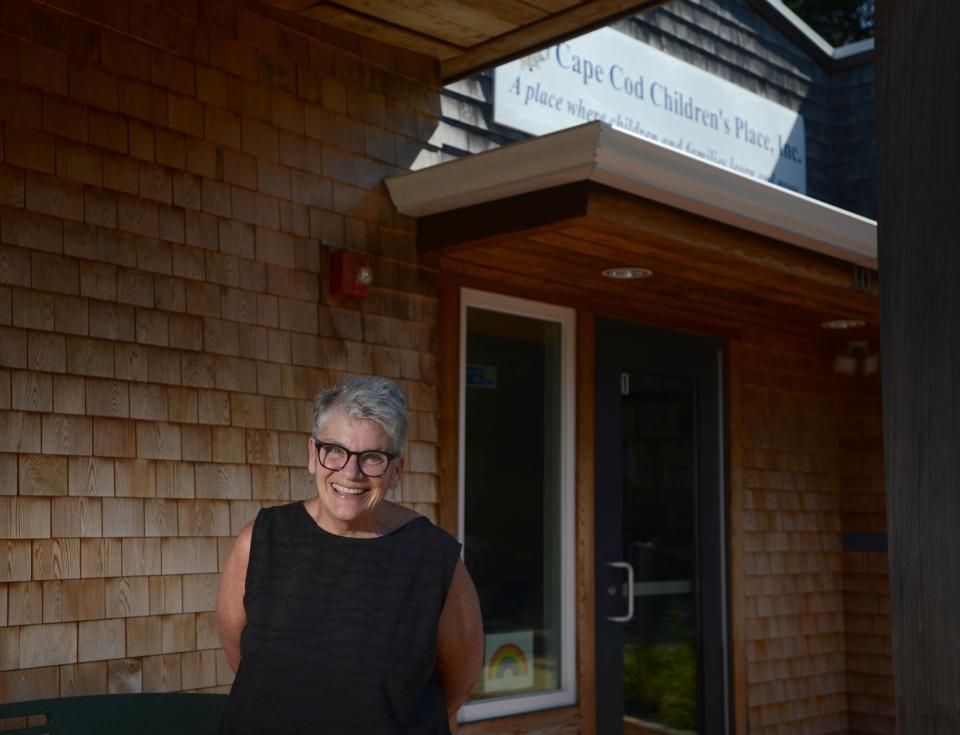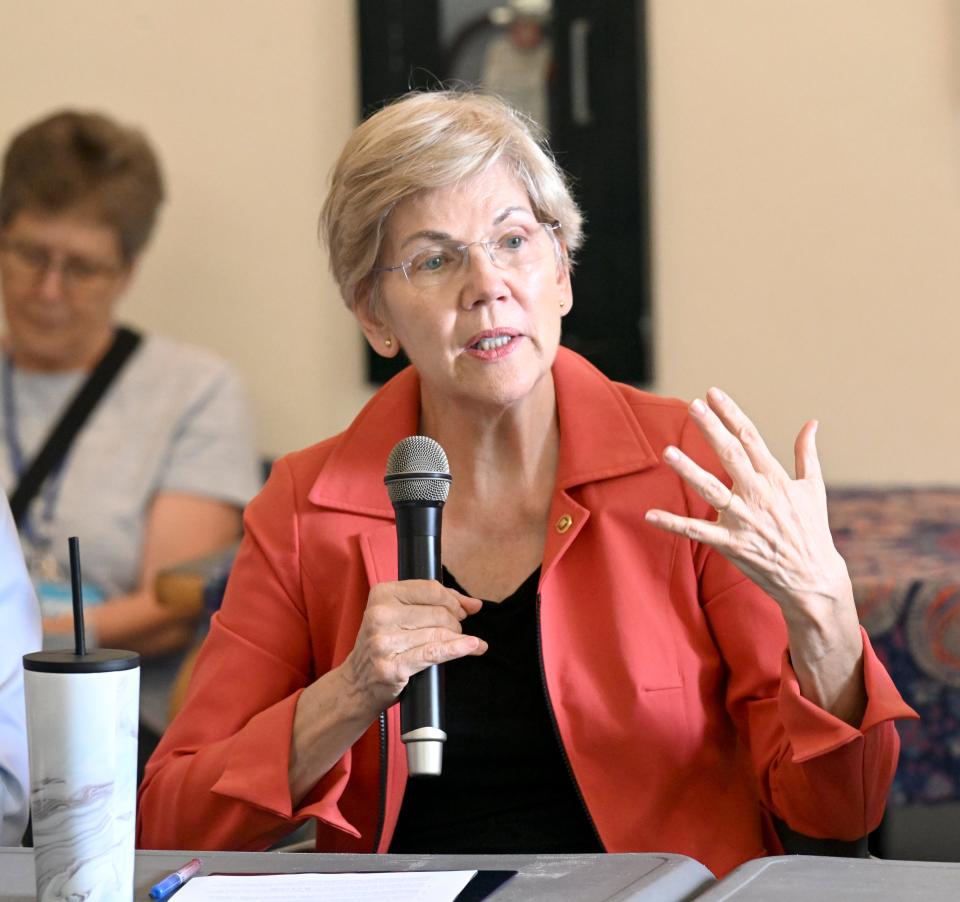Mass. families lose $1.7 billion in wages annually due to scarcity of child care
- Oops!Something went wrong.Please try again later.
The scarcity of child care facilities and qualified workers to staff them is costing Massachusetts families $1.7 billion a year in lost wages due to missing work or reduced work hours, according to the Massachusetts Taxpayers Foundation.
Additionally, employers are losing $812 million a year in low productivity and employee turnover and replacement costs because workers cannot find adequate child care, according to the foundation.
What’s needed, the report suggests, is the reform of the state’s child care system. Reform will grow the economy — and lift families, businesses and the state with it.

That idea is shared by child care providers, employees and businesses across the state and Cape Cod. Sen. Elizabeth Warren, D-Mass., recently announced another call for the federal government’s support of universal child care.
Under Warren's proposed plan, a family in Massachusetts making $130,125 annually with an infant and a two-year-old would pay no more than $10 per day, or $200 per month, far lower than the current average cost of $3,128 per month, according to Warren’s office.
The bill would also ensure that higher-income families pay no more than 7% of their income on child care, and lower-income families making less than 75% of their state’s median income would be fully subsidized.
According to a report by the Rennie Center for Education Research & Policy for the Cape Cod Commission released in June, the average cost of infant care in the state is $21,000 a year or $1,743 per month. The average cost for a toddler is $15,000 a year, or $1,250 per month.
The U.S. Department of Health and Human Services recommends that families spend about 7% of their income on child care. In order to meet that benchmark, with the $21,000 average cost of infant care, a family would have an income of $300,000.
Child care as critical as investing in infrastructure
Tom Weber, executive director at the Massachusetts Business Coalition for Early Childhood Education, gives Warren credit for making child care a national topic of conversation. Her proposal would cap child care costs with the help of federal funding.
Cape Cod Children’s Place Executive Director Cindy Horgan said the Massachusetts Taxpayers Foundation’s report is proof that investing in child care and early childhood education is as critical as investing in infrastructure such as roads, bridges, and wastewater.
“When we improve how we take care of families, the outcome is an economic gain for everybody,” she said.
Warren agrees, saying the issue is about democracy.
"We come together to make laws that are good for all of us, that help promote an economy that works for everyone, to help promote opportunities for everyone who wants a chance to work,” Warren told the Times in a telephone interview on Friday. “The same way roads, bridges, transit and power are all about making investments so this country and this economy can operate. Child care is just part of that.”
Scarce child care, labor shortage connected
Weber thinks federal resources are necessary to deliver what families and the local economy need. But he said businesses are increasingly recognizing the connection between child care and labor force challenges, such as finding and retaining talent.
Nothing brought that realization home as dramatically as the COVID pandemic. Child care workers left the industry in droves. Low pay and substandard benefits have long been barriers to filling those positions. Without workers, there isn’t room for children. Without child care, some people can’t work. Without workers, businesses suffer.
The state loses about $188 million a year in lower tax revenues due to lower earnings and lost wages, according to the taxpayer foundation. The combined loss to families, business and the state due to the lack of child care is $2.7 billion a year.

Public policies and strategies that incentivize employers to invest in this area make fiscal sense, Weber said. But incentives must be specific to individual businesses and their needs. For example, onsite child care, referral services, remote work possibilities, and even company contributions to child care expenses might be possible.
Warren claims federal support is necessary to ensure companies pay, that no one shirks their responsibilities and that resources are made available to every child. She likened it to taxpayer support for educating children from kindergarten through 12th grade. The economics of child care doesn’t work without government support, she said.
Raising pay for child care workers 'essential'
“The United States is 35th out of the 37 richest nations in terms of the investment we make in our babies,” Warren said. “That's a terrible mistake. No nation can build a future, strengthen its economy by shortchanging child care and early childhood education.”
Massachusetts could pass its own bills this legislative session. Sandra Faiman-Silva, a Cape Cod activist with Common Start Coalition, is hopeful that bills before the state House and Senate will be passed and provide money for child care that would be administered through the state’s Department of Early Education and Care. The legislation would provide a comprehensive approach to securing money, she said.
“Funding is essential,” Faiman-Silva said. “Parents can’t afford it (child care). Facilities can’t run high-quality facilities without money. They (facilities) can’t find workers because of low pay.”
Raising the pay of early childhood education workers is essential, Horgan said. Many employees walked away from their $15-an-hour jobs during the pandemic, she said. Keeping children safe during the pandemic, coupled with low pay and poor benefits led to an exodus, which led to child care facility closures, which led to a child care crisis on Cape Cod.
“This isn’t about a puppy mill,” Horgan said. “It’s about creating a workforce who can make a living.”
Warren said her proposal would give mothers an opportunity to go into the workforce, put child care workers’ earnings in line with their training and responsibilities, and enhance children's early development.
“We know that babies are learning when they are still in the crib, and high-quality child care is also early childhood education,” Warren said.
Contact Denise Coffey at dcoffey@capecodonline.com. Follow her on Twitter: @DeniseCoffeyCCT.
Stay connected with Cape Cod news, sports, restaurants and breaking news. Download our free app.
This article originally appeared on Cape Cod Times: Addressing $2.7 billion cost of inadequate child care in Massachusetts

